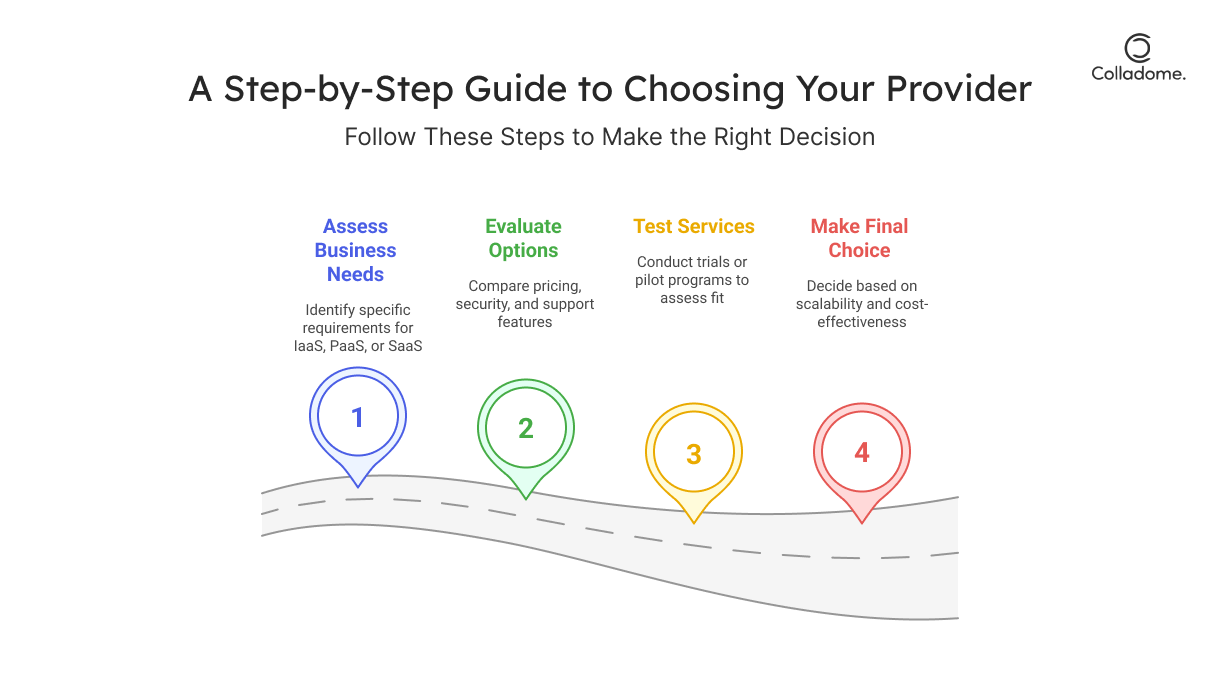“Picking the perfect cloud? Let’s navigate the fluffy skies of cloud service providers and find the one that works magic for you in 2024!”
Introduction
Alright, let’s get real. Picking the right cloud service provider in 2024? It’s a huge deal. If you think it’s just about storage, think again. Whether you need cloud hosting, IaaS, or PaaS, this decision can make or break your business’ growth. There are giants like AWS, Google Cloud, and Azure leading the charge, but how do you know which one’s the real MVP for your needs?
In this guide, we’re cutting through the noise to show you what makes the best cloud service provider. We’re talking flexibility, scalability, cost-effectiveness—basically, everything that’ll get your business running smoother and faster in the cloud. From startups to big leagues, finding the top cloud providers is essential if you want to stay ahead of the game.
Ready to level up? Let’s dive in and find the perfect match to fuel your digital transformation.
Why Is Choosing the Right Cloud Service Provider Important?

1. Critical Business Operations
Your cloud provider powers core functions like data storage, disaster recovery, and app hosting—making it the heartbeat of your business. If it fails, everything else might.
2. Cost Efficiency
Flexible pricing models from the right provider help lower both CapEx and OpEx, letting you scale your tech without scaling your budget. You pay only for what you use, saving you money.
3. Top-Notch Security & Compliance
From encryption to GDPR and HIPAA, the right provider ensures your data stays secure and compliant with global standards. Security isn’t just a feature—it’s a necessity.
4. Future-Proofing
Look for providers that integrate cutting-edge tech like AI, machine learning, and serverless computing. You need a partner that’s as innovative as your business, so you’re not left behind as tech evolves.
| Why It’s Critical | What It Means for You | Why It Matters |
| Critical Operations | Powers your core functions—data, apps, recovery. Without it, you’re done. | If the cloud fails, everything fails. It’s your business backbone. |
| Cost Efficiency | Pay-as-you-go options keep you from burning through cash. | Scale smart without scaling the budget—save big. |
| Top Security | Your data’s locked down with encryption, GDPR, and HIPAA compliance. | The right provider means NO breaches and NO compliance headaches. |
| Future-Proofing | Look for AI, serverless computing, and other next-gen tech. | Stay ahead or get left behind—innovate with your cloud partner. |
What to Consider When Choosing a Cloud Service Provider
1. Service Models (IaaS, PaaS, SaaS)

-
- IaaS (Infrastructure as a Service): You get full control over your infrastructure. It’s like renting out a fully customizable cloud mansion. AWS and Google Cloud are the big players here, offering massive scalability for enterprises.
- PaaS (Platform as a Service): If you’re a developer itching to build apps without worrying about servers, Azure or Salesforce is your go-to. It’s like using a pre-built platform where you focus purely on the creative side while the provider handles the heavy lifting.
- SaaS (Software as a Service): This is the “buy it, plug it in, and get to work” model. Think Dropbox, Google Workspace, or Slack. These are ready-to-go applications that save you from the hassle of installation and maintenance.
2. Performance and Reliability
Don’t settle for mediocre uptime. You need a provider that guarantees 99.9% uptime (or higher) in their SLAs. Downtime means lost revenue and frustrated customers. So, look for top cloud computing providers with ironclad reliability.
3. Security Features
Data is gold, so protect it like Fort Knox. Look for data encryption, two-factor authentication, and compliance certifications (like GDPR and HIPAA). After all, the best cloud service provider is only as good as their security.
4. Cost and Pricing Models
Don’t be blindsided by pricing—dig into the fine print. Pay-as-you-go? Reserved instances? Or maybe long-term commitments? Each model has pros and cons, so make sure you understand how you’re being billed. Get a provider with pricing flexibility that aligns with your business needs.
5. Support and Service Level Agreements (SLAs)
Let’s face it—things go wrong. Make sure your cloud provider offers 24/7 support, quick response times, and a clear escalation process. The last thing you need is to be left in the dark when your cloud service goes down.
How to Choose the Best Cloud Service Provider
Step 1: Identify Your Business Needs
Before jumping into the vast world of cloud service providers, take a deep breath and assess your actual needs. What are you looking for? Massive compute power? Tons of storage? Seamless networking? Write down what matters most to you:
- Compute power: Do you need high-performance servers or more basic setups?
- Storage: Are you dealing with terabytes of data or just a few gigabytes?
- Networking: Do you need a high-speed, global network for your users or just a localized solution?
And, if you want to keep your options flexible (and smart), consider hybrid or multi-cloud strategies. This allows you to mix and match different providers for optimal performance and cost efficiency.
Step 2: Evaluate Top Cloud Providers
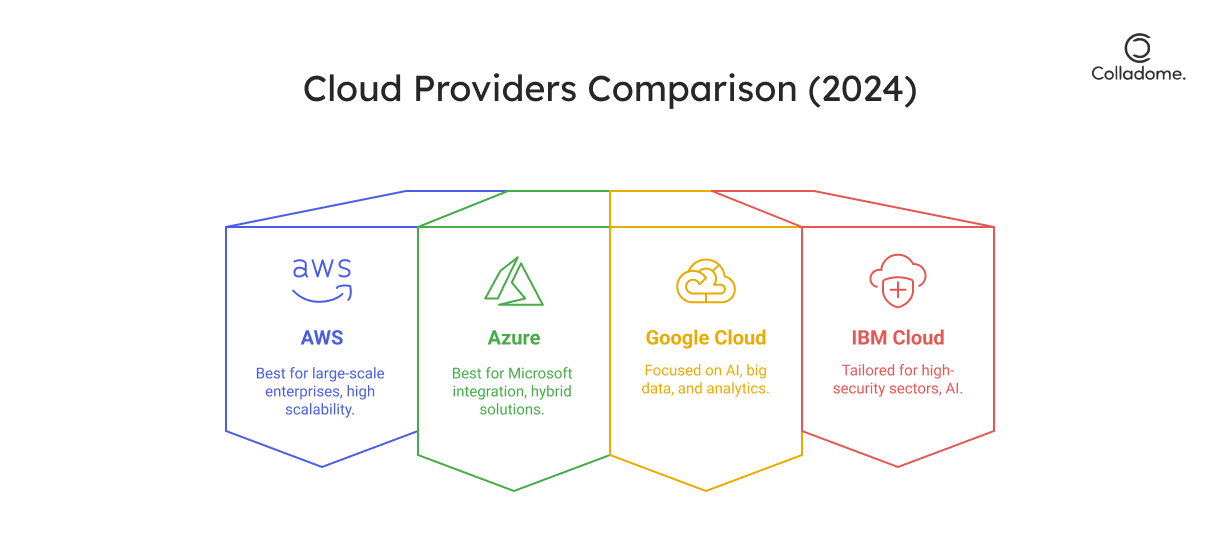
Now, let’s talk about the heavy hitters in the cloud game. These top cloud providers dominate the space, and each offers a unique set of benefits to match different business needs.
- Amazon Web Services (AWS): The big dog on the block. AWS leads the market with its extensive range of cloud services for enterprises and startups alike. Whether you need IaaS, PaaS, or SaaS, AWS has it all.
- Microsoft Azure: If you’re a Microsoft-centric business or use tools like Office 365, Azure is a seamless choice for integration. It’s like having the best of both worlds.
- Google Cloud Platform (GCP): This one’s for the data nerds. GCP excels in data analytics, AI, and machine learning, so if that’s your focus, this is your platform.
- IBM Cloud: Looking for enterprise-grade solutions? IBM Cloud offers powerful computing and AI capabilities that suit large-scale businesses. It’s also a favorite for industries needing strong security.
- Oracle Cloud: Specializing in database management and enterprise applications, Oracle Cloud is ideal for companies with complex data needs.
- Alibaba Cloud: Dominating in Asia, this one’s known for scalability. If you have a global reach or want to tap into the booming Asian markets, this is the cloud service provider to watch.
- Salesforce: Focused on CRM and PaaS, Salesforce is the go-to if you’re looking to elevate your customer relationship management.
- SAP Cloud: For businesses looking for an all-in-one ERP system, SAP Cloud is perfect for optimizing business processes and ensuring smooth operations.
- DigitalOcean: For developers and small businesses, DigitalOcean is the answer. It’s known for its simplicity, making it perfect if you don’t want to get tangled up in complicated cloud setups.
- VMware Cloud: If you’re after a hybrid cloud solution, VMware Cloud offers the flexibility and control that many enterprises crave, enabling seamless integration between private and public clouds.
Step 3: Run a Test Drive
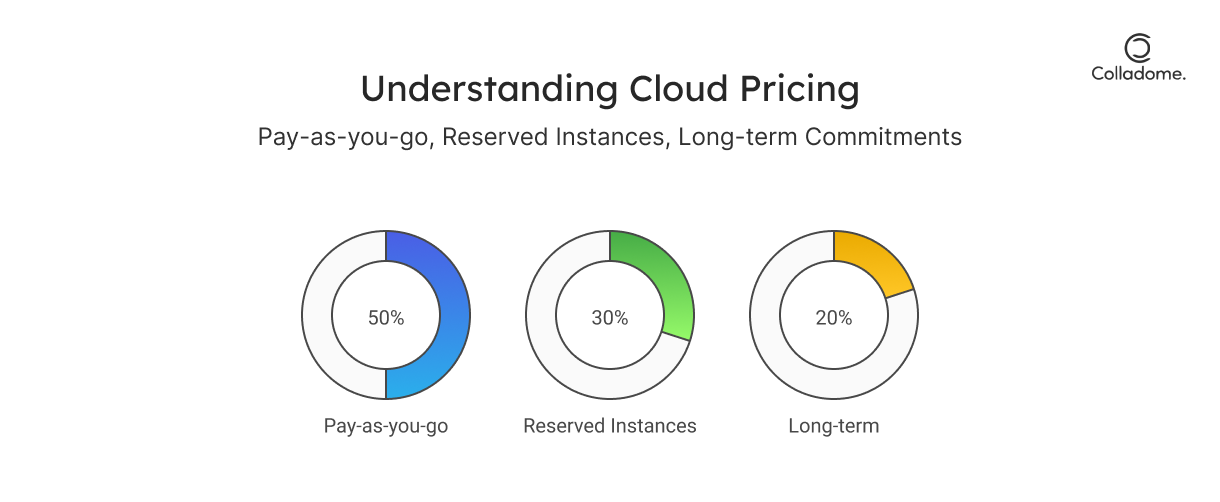
Now that you’ve narrowed down the top cloud service providers to a few contenders, it’s time for the ultimate test: test drives.
- Take advantage of free trials and sandbox environments to see how the platform performs in real time.
- Test the user experience, check out the support systems, and gauge performance.
- Test your most critical operations to make sure the cloud provider can handle your business needs.
Real-Time Examples
When it comes to choosing the best cloud service provider, real-world examples can provide a clearer picture of how these cloud-based service providers are making waves across industries. From scaling operations to leveraging powerful AI capabilities, businesses are turning to the cloud for a competitive edge. Let’s look at how some global and Indian companies are harnessing the power of top cloud providers.
India: Cloud Solutions Driving Success
1. Zomato with AWS
-
- Challenge: Zomato, one of India’s leading food delivery platforms, needed a reliable cloud service to manage its dynamic workloads, especially during high-demand periods like festive seasons.
- Solution: AWS stepped in to provide the scalable cloud infrastructure as a service (IaaS), allowing Zomato to manage fluctuating demand efficiently. AWS not only helped Zomato scale its operations but also ensured faster and more reliable delivery services during peak times.
- Result: Zomato saw enhanced performance, better load management, and a more seamless customer experience.
2. ICICI Bank with Microsoft Azure
-
- Challenge: As a leading Indian bank, ICICI needed secure and scalable solutions to handle a massive influx of transactions and sensitive customer data.
- Solution: Microsoft Azure provided the necessary platform as a service in cloud computing (PaaS) to enable ICICI Bank to run secure banking solutions while offering advanced data analytics for customer insights.
- Result: ICICI Bank enhanced its ability to provide personalized customer services, improved security, and streamlined operations, positioning itself as a tech-savvy financial leader.
Worldwide: Cloud Powering Industry Giants
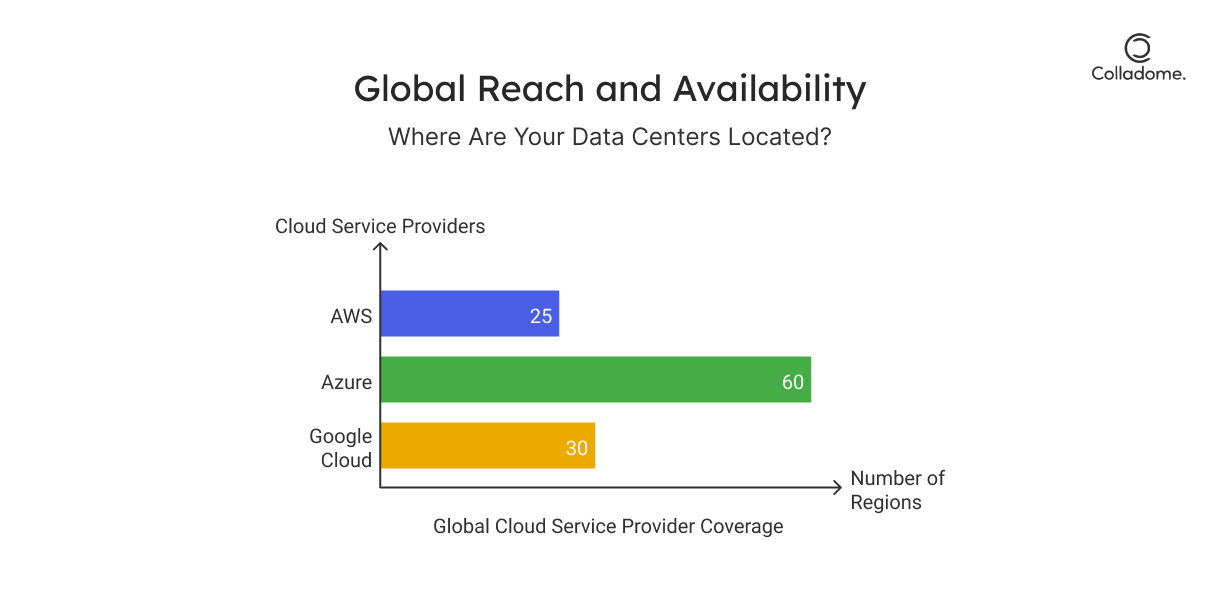
1. Spotify and Google Cloud
-
- Challenge: Spotify, the world-renowned music streaming service, needed robust infrastructure to handle millions of users streaming music in real-time while offering personalized music recommendations.
- Solution: Spotify turned to Google Cloud Platform (GCP) for its unmatched machine learning capabilities. GCP’s scalable architecture allowed Spotify to build powerful algorithms for music recommendations, manage user data securely, and scale rapidly.
- Result: Enhanced music recommendations, faster data processing, and a more personalized user experience, all while maintaining the platform’s reliability and performance.
2. Netflix with AWS
-
- Challenge: Netflix is a global leader in streaming content, and it requires an extremely reliable and scalable infrastructure to stream high-definition video to millions of users simultaneously without compromising quality.
- Solution: AWS has been Netflix’s backbone, providing the best cloud infrastructure as a service to power its global streaming operations. With the flexibility to scale on demand, AWS handles Netflix’s massive data and content delivery needs.
- Result: Netflix delivers seamless, buffer-free streaming to its millions of subscribers around the world, backed by unmatched cloud performance and reliability.
Why Cloud Computing is a Game-Changer
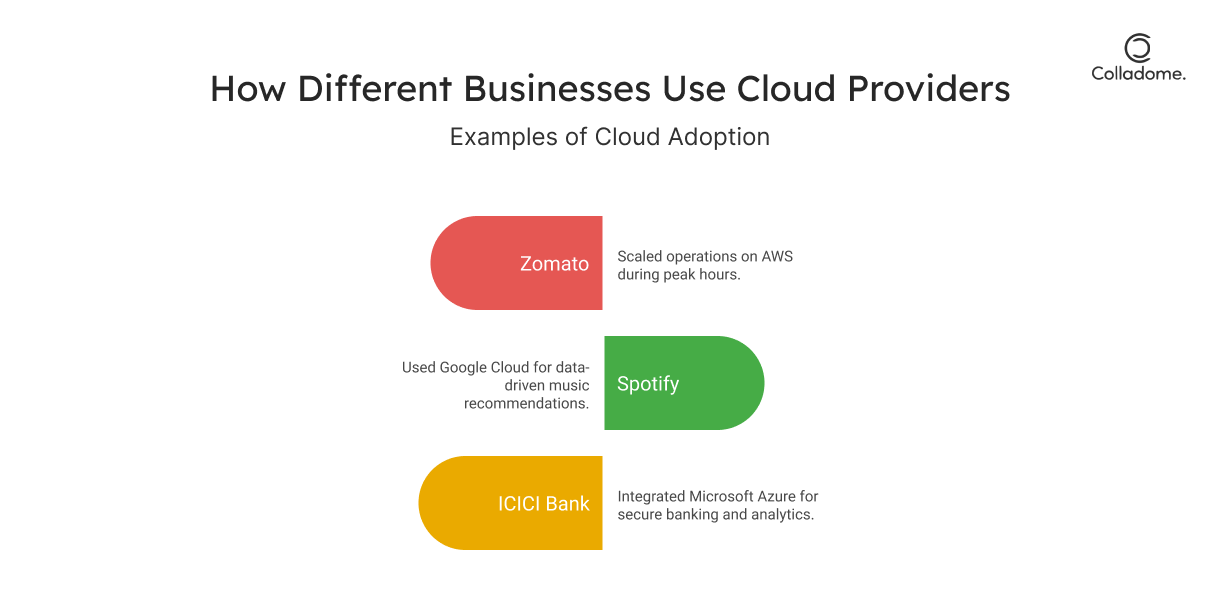
Whether you’re a startup scaling up operations or an established giant looking to innovate, choosing the right cloud service provider like AWS, Google Cloud, or Microsoft Azure can give you the edge you need. These top cloud providers are shaping industries across the globe with their robust, flexible, and innovative solutions.
So, the next time you’re evaluating top cloud computing companies, remember these examples. They highlight not only the technical capabilities of each cloud but also the strategic impact they have on businesses, whether it’s driving AI, improving data security, or ensuring global scalability.
Choose wisely. Your business could be the next big success story to emerge from the cloud!
Statistics
| Metric | Value | Source |
| Global Cloud Market Size | $623 billion (2023) | Gartner |
| CAGR (2023–2027) | 15.8% | Grand View Research |
| AWS Market Share | 33% | Synergy Research Group |
| Microsoft Azure Market Share | 22% | Synergy Research Group |
| Google Cloud Market Share | 10% | Synergy Research Group |
Conclusion
Choosing the best cloud service provider in 2024 isn’t just about picking a name from the top cloud providers list. It’s about making sure that the provider’s cloud-based services align perfectly with your unique business needs. From cloud infrastructure as a service to platform as a service in cloud computing, every provider offers a different set of tools, features, and pricing models.
The key is to prioritize what matters: scalability, security, and cost-efficiency. These are the driving forces behind cloud transformation in today’s business world. Once you have those in mind, you’ll be in a better position to choose a provider that doesn’t just keep the lights on but helps your business thrive.
And hey, at Colladome, we get it. We’ve seen how a cloud service provider can elevate not just the operations of a business, but the entire customer experience. That’s why we emphasize the importance of finding a partner who gets your vision and offers the right cloud infrastructure for long-term growth. Whether you’re considering the top 10 cloud hosting providers or a platform as a service, remember—what works for one company might not be right for you. Test the waters, explore free trials, and run real-world tests to make sure you’re making the right call.
Call to Action
Now that you’re armed with insights on cloud computing service providers, it’s time to dive in and explore your options. Start by assessing your needs: Do you need a cloud service provider that offers scalable solutions? Or are you looking for specific tools like PaaS or IaaS? Once you have a clear picture, get your hands dirty—test out platforms, compare prices, and dig into customer support. Your ideal cloud partner is out there, and finding them is just a click away!



